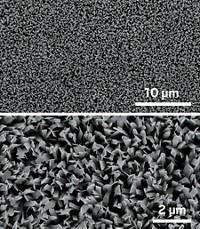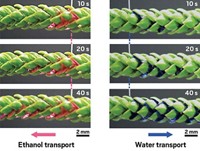Advertisement
Grab your lab coat. Let's get started
Welcome!
Welcome!
Create an account below to get 6 C&EN articles per month, receive newsletters and more - all free.
It seems this is your first time logging in online. Please enter the following information to continue.
As an ACS member you automatically get access to this site. All we need is few more details to create your reading experience.
Not you? Sign in with a different account.
Not you? Sign in with a different account.
ERROR 1
ERROR 1
ERROR 2
ERROR 2
ERROR 2
ERROR 2
ERROR 2
Password and Confirm password must match.
If you have an ACS member number, please enter it here so we can link this account to your membership. (optional)
ERROR 2
ACS values your privacy. By submitting your information, you are gaining access to C&EN and subscribing to our weekly newsletter. We use the information you provide to make your reading experience better, and we will never sell your data to third party members.
Materials
Rolling Out Liquid-Metal Motors
Researchers make motors run on salt water
by Matt Davenport
March 16, 2015
| A version of this story appeared in
Volume 93, Issue 11
Micro- and nanoscopic motors can zip through fluids with ease fueled purely by chemical reactions, but making similar machines at larger scales is a challenge. Researchers led by Jing Liu of Tsinghua University, in China, appear to have overcome that challenge by using globs of liquid metal, some salt water, and aluminum flakes (Adv. Mater. 2015, DOI: 10.1002/adma.201405438). By feeding aluminum to macroscopic orbs of liquid gallium-indium alloys sitting in sodium hydroxide solutions, the team created self-propelled submersibles. The locomotive liquid orbs roll along with speeds of about 5 cm per second thanks to two driving forces, the team posits. One is the thrust from jets of hydrogen bubbles created by the redox reaction between aluminum and sodium hydroxide. The second force comes from a pressure gradient across the droplet, the team says. Electrochemical interactions among the liquid metal, aluminum, and electrolyte distort the electric potential around the droplet’s surface and skew its surface tension. Pressure builds near the aluminum at the droplet’s tail end, thus pushing the liquid metal forward. These liquid-metal motors could help create a variety of devices, including soft robots, the researchers say.
Metal Mollusks(Video no longer available)
Droplets of a gallium-indium alloy distort to navigate obstacles, not unlike mollusks, according to researchers at Tsinghua University.
Credit: Adv. Mater.





Join the conversation
Contact the reporter
Submit a Letter to the Editor for publication
Engage with us on Twitter